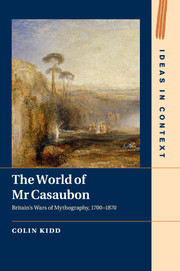Book contents
- Frontmatter
- Contents
- Acknowledgements
- 1 Prologue: Casaubon's Dubious Bequest
- 2 The Key to All Mythologies
- 3 The Legacies of the Ancients in Enlightenment Mythography
- 4 The Obsessions of Jacob Bryant: Arkite Idolatry and the Quest for Troy
- 5 The Dispute of the Orient: Anglo-French Rivalries in an Age of Revolution
- 6 Fish-gods, Floods and Serpent-worship: From Apologetics to Anthropology
- 7 Epilogue: The Keys to All Mythology in 1872
- Index
- Miscellaneous Endmatter
7 - Epilogue: The Keys to All Mythology in 1872
Published online by Cambridge University Press: 24 November 2016
- Frontmatter
- Contents
- Acknowledgements
- 1 Prologue: Casaubon's Dubious Bequest
- 2 The Key to All Mythologies
- 3 The Legacies of the Ancients in Enlightenment Mythography
- 4 The Obsessions of Jacob Bryant: Arkite Idolatry and the Quest for Troy
- 5 The Dispute of the Orient: Anglo-French Rivalries in an Age of Revolution
- 6 Fish-gods, Floods and Serpent-worship: From Apologetics to Anthropology
- 7 Epilogue: The Keys to All Mythology in 1872
- Index
- Miscellaneous Endmatter
Summary
But it was clear enough to her that he would expect her to devote herself to sifting those mixed heaps of material, which were to be the doubtful illustration of principles still more doubtful … And now she pictured to herself the days, and months, and years which she must spend in sorting what might be called shattered mummies, and fragments of a tradition which was itself a mosaic wrought from crushed ruins – sorting them as food for a theory which was already withered in the birth like an elfin child.
(Middlemarch, ch. 48)With his taper stuck before him he forgot the absence of windows, and in bitter manuscript remarks on other men's notions about the solar deities, he had become indifferent to the sunlight.
(Middlemarch, ch. 20)The subject Mr Casaubon has chosen is as changing as chemistry: new discoveries are constantly making new points of view.
(Middlemarch, ch. 22)The death of Mr Casaubon part way through the narrative of Middlemarch – at a point where even his wife, who had married him as an aspirant amanuensis, has come to recognise the futility of his project – is also meant to signal the extinction of Christian mythography as a viable form of intellectual life in the England of the 1830s. Already overtaken by pioneering developments in the German science of mythology, it was discredited and lacked any intellectual cachet, or so Eliot would have us believe. No longer could myth be used to support biblical truth; rather, the Bible had itself been exposed as a kind of mythology. A relic of a misguided, bygone antiquarianism, mythographical apologetics had no place in the reformed – and demythologised – world of social improvement and science.
However, as we have seen, the British wars of mythography did not come to an end in the 1830s. Across the four decades between the setting in which the action of Middlemarch takes place and the era of the book's publication, mythographers went on acquiring new forms of apologetic weaponry. Mere pea-shooters these might prove, as Eliot rightly perceived and as we know in hindsight, but at the time developments in mythography and in related bodies of scholarship such as Assyriology, Egyptology and Middle Eastern archaeology seemed to many commentators like the heavy artillery of a new military counter-revolution.
- Type
- Chapter
- Information
- The World of Mr CasaubonBritain's Wars of Mythography, 1700–1870, pp. 200 - 226Publisher: Cambridge University PressPrint publication year: 2016

